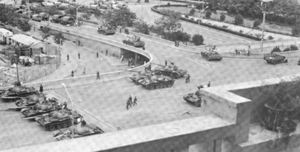User:Poshyte/Sandbox11
Republic of Saiho 西芳共和国 (Saihoan) Nishi Yoshi kyōwakoku | |
|---|---|
Coat of arms
| |
| Anthem: 彼の名誉が私たちを導きましょう Kare no meiyo ga watashitachi o michibikimashou "Let his honour guide us" | |
| Capital | Fujikawa |
| Largest city | Okagaki |
| Official languages | Saihoan |
| Ethnic groups (2021) | TBD |
| Demonym(s) | Saiho |
| Government | Unitary dominant-party semi-presidential republic under a military dictatorship |
| Yukiya Saeki | |
| Banri Niwata | |
• President of the Assembly of the Republic | Vacant |
| Legislature | Assembly of the Republic |
| Establishment | |
• TBD | 30 February 0 |
• TBD | 30 February 0 |
• TBD | 30 February 0 |
• TBD | 30 February 0 |
| 1899 | |
| 1946 | |
| 1967 | |
• Current constitution | 2002 |
| Population | |
• 2021 census | 88,483,947 |
| GDP (PPP) | 2021 estimate |
• Total | $2.515 trillion |
• Per capita | $28,430 |
| GDP (nominal) | 2021 estimate |
• Total | $1.186 trillion |
• Per capita | $13,403 |
| Gini | 39.2 medium |
| HDI (2022) | 0.828 very high |
| Currency | Saihoan yen (¥) |
| Driving side | right |
| Calling code | +102 |
Saiho (Saihoan: 西芳, Nishi Hō), officially the Republic of Saiho (西芳共和国, Nishi Yoshi kyōwakoku), is a country in Isuan on the Saihoan peninsula and has an area of TBD square kilometres. The country has a population of 88,483,947. It borders X in the north and shares maritime borders with Selajung and Songha. The country's capital city is Fujikawa and the largest city is Okagaki.
The first civilisations in Saiho emerged in the Yōtei mountain range in the north of the country as various city states. The Aoikawi dynasty was the first Saihoan nation to emerge in the second century BC and was in control of much of the Saihoan peninsula. The Aoikawi dynasty lasted until 982 when it suddenly collapsed and split the area into several different warring states. The Yanami dynasty emerged as the victor out of the warring states and expanded the country past the Yōtei mountain range and across the northern coast of the Sea of Qes. Several more dynasties consolidated Saiho's grip on it's territories and presided over a golden age of Saihoan culture. Saiho, initially resistant to Auressian influence became increasingly influenced by Auressian powers which enforced a series of unequal treaties against the state.
The ruling Futamura dynasty which had been installed in 1857 by an Auressian intervention was overthrown and the First Republic of Saiho was declared in 1899. The First Republic joined the Second Great War on the side of the Coalition to retake the Eastern Straits of Qes from Songha and played a vital role in the Battle of the Straits. Following the war, the country was left in immense debt and faced the task of rebuilding much of it's infrastructure, in response to the government slashing the military budget alongside other factors a left-wing military faction led by Enatsu Munemori issued the Declaration of the People's Republic of Saiho and began the Saihoan civil war where the socialists emerged victorious. The People's Republic of Saiho was initially very successful and the standard of living in Saiho grew rapidly, worsening economic conditions as well as the armed forces fearing they would lose power led to a coup d'état and the declaration of the Third Republic of Saiho. The military junta was overthrown by student demonstrators in 1990 and replaced by a parliamentary democracy.
In 1997 radical forces in the army and navy attempted a coup d'état that killed many high-ranking government officials. After a period of instability known as the Red months, Yukiya Saeki became Prime Minister and led an coup d'état against the government which installed himself as President of Saiho. The 2002 constitution of Saiho granted the military 200 seats in the Assembly of the Republic and gave the military a larger role in politics. Since 2005 the country's economy has grown at a rapid pace.
As of 2022 Saiho has a very high position on the Human Development index and has a universal healthcare system as well as one of the longest life expectancies in the world. Saiho controls the northern half of the eastern straits of the Sea of Qes, a strategically important chokepoint in eastern Isuan. It is a member of several international organisations such as BLANK.
Etymology
History
Pre-history
Aoikawi period
Warring states period
Yanami period
Golden age of Saiho
Futamura period
First Republic
People's Republic
Second Republic
Third Republic

